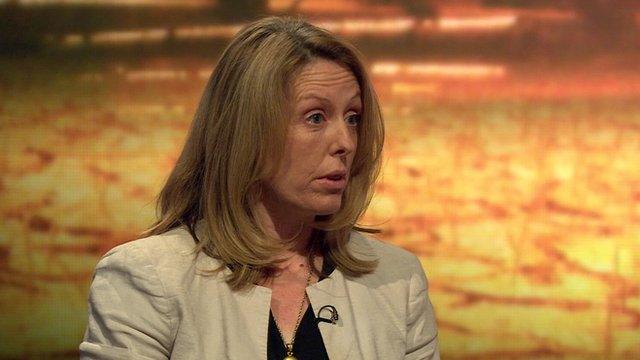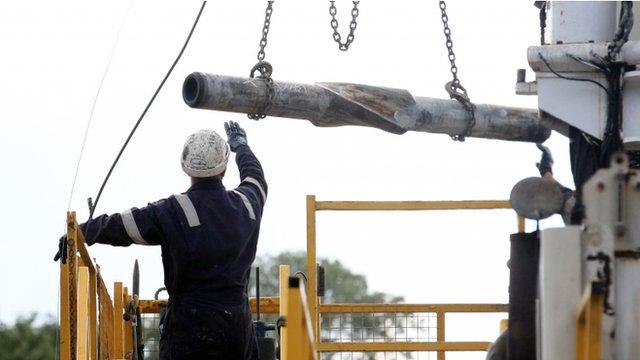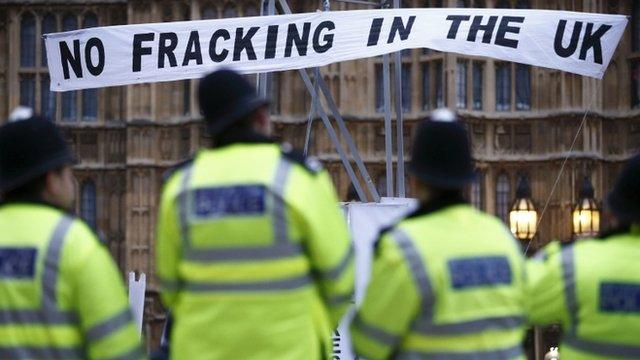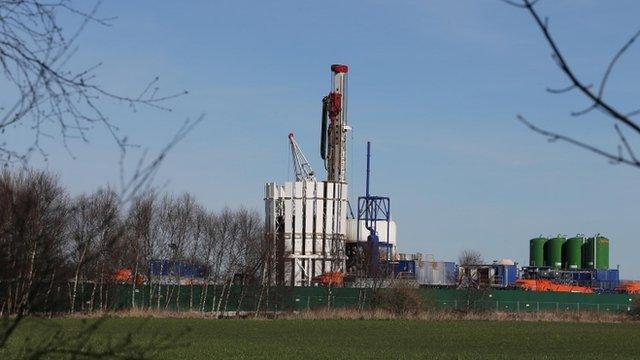Fracking: Think again, campaigner urges environmentalists
- Published

Baroness Worthington says shale gas should only be developed if its emissions are captured and stored
Environmentalists should keep cool heads over fracking, says Friends of the Earth's former climate campaigner.
Bryony Worthington - now Labour shadow energy minister - says fracking will create less CO2 than compressing gas in Qatar and shipping it to Britain.
But she insists shale gas should only be developed if its emissions are captured and stored underground.
The current FoE position is that more fossil fuel exploitation will further destabilise the climate.
Nonetheless, Baroness Worthington's intervention may prove significant. She is a professional climate and energy analyst, and one of the architects of the UK's radical Climate Change Act.

There has been exploratory drilling at sites in the UK, such as in the village of Balcombe, West Sussex
"We have to be realistic," she told BBC News. "We are going to be using gas for a long time because of the huge role it plays for heating homes and for industry.
"The important thing is to minimize the carbon emissions from gas. That means if we can get our own fracked gas, it's better to use that than importing gas that's been compressed at great energy cost somewhere else."
Assigning responsibility
She believes NGOs (green groups) have been opportunistic in gathering support for green causes by taking an absolute position on shale gas.
"We have the mother of all challenges getting emissions of greenhouse gases out of our energy system - environmentalists should not be adopting a priori objections to technologies but appraising them with a cool head," she argued.
Her former colleague, Friends of the Earth's director Craig Bennett, replied: "Fracking won't help us tackle climate change. Even people in the industry agree that shale gas wouldn't make any big difference to our energy sector until the mid-to-late 2020s, which is exactly when the UK needs to start getting out of gas, wherever it comes from.

Many environmental campaigners, and the Green Party, oppose fracking
"Building a whole new gas infrastructure will keep us addicted to expensive fossil fuels for decades to come, just when other European countries will be benefiting from much cheaper renewables."
Both Baroness Worthington and Mr Bennett agreed on the need to speed the development of carbon capture and storage (CCS), the process in which CO2 emissions are stripped out of power station exhausts and forced into rocks underground.
The Labour peer is urging the government to consider whether firms bringing fossil fuels into the UK should be obliged to take responsibility for capturing the resulting CO2 emissions and burying them.
This would re-frame the CO2 issue by treating CO2 as a waste product like any other, to be disposed of by the firm that used the fossil fuel.
North Sea future
She concedes that emissions from mobile sources like transport cannot be captured, but says oil importers could pay for the storage of equivalent amounts of carbon emissions in developing countries.
She said: "The UK has great potential to lead Europe on the development of CCS. But we need to consider how best to fund and incentivise it.
"The idea of requiring oil and gas extractors and importers to play their part is certainly worthy of exploration, especially done in a way that helps harness market forces to find the least cost solutions."

A test site for fracking at Barton Moss, Manchester
The Conservative peer Matt Ridley is offering his qualified support, as injecting CO2 into North Sea oil fields would enhance recovery of hard-to-get oil. He told the BBC: "A mechanism for supporting CCS without hitting electricity prices further is worth considering to give the North Sea a new lease of life.
"Given that fossil fuels are being hit with ever higher taxes, such as the UK's unilateral carbon price floor, perhaps it makes sense to replace that with a requirement that fossil fuel producers and importers divert funds to CCS projects."
However, Craig Bennett said: "Betting everything on carbon capture and storage is highly risky. There has been a billion-quid taxpayer subsidy on the table for CCS for a decade and yet it's still not happening. It's increasingly looking like a pipe dream."
The government strongly supports fracking. The Green Party opposes it. The Lib Dems support the technology, with tight environmental conditions. They also support CCS.
Labour has been cautiously in favour of fracking, although the front-runner for the leadership, Jeremy Corbyn, is anti-fracking.
Follow Roger on Twitter @rharrabin, external